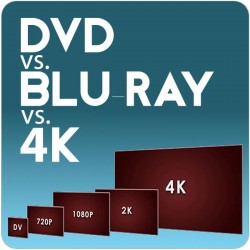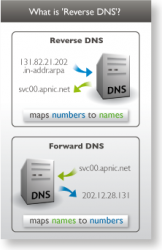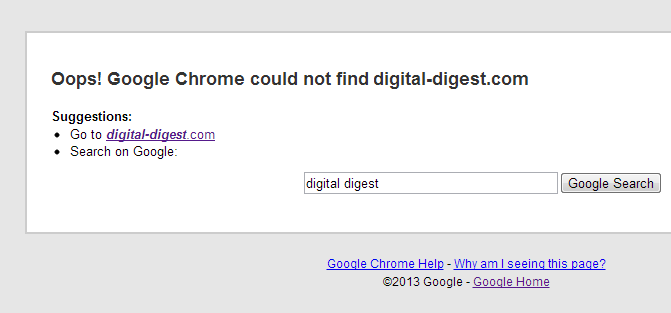So for the first time in five years (may not be factually accurate), I missed sending out an issue of the WNR. Not only that, the entire website went down for a couple of days. Coming on the eve of the SOPA protests a year ago, you can be forgiven for thinking that this was something sinister (or a repeat of the protest), but in the end, it was just a series of unfortunate events really. You can read about what actually happened here.
So with two week’s worth of WNR to go though, you might be forgiven again to think that this will be a choc-a-bloc special edition, but actually, news-wise, it has been pretty quiet (although I may have been too busy kicking myself to have noticed all the going-ons). So let’s get started before I or someone else accidentally borks the website again.
But before we start, I want to say a few things about the untimely death of Aaron Swartz, things that I had wanted to say last week but didn’t get the chance to. My first emotion upon hearing the news was obviously anger. Anger at the way prosecutors hounded a young and talented man, who has already contributed so much, and had so much more to contribute, to his death over such a petty things as copyright. Especially when those on Wall Street that were responsible for nearly destroying the world economy for their own petty gains never got the kind of prosecutorial attention that Aaron was subject to.
But instead of focusing on these negative emotions, something that young Aaron might have been doing too before his final act, perhaps it’s best to simply remember Aaron for all of this contributions, from RSS to Reddit, to Creative Commons to Demand Progress. If we can all, in our small way, continue to carry the torch for Aaron and continue the great work he started, then that’s how we will win!

American Assembly have finally released the full copy of their eagerly awaited Copy Culture Survey, after a sneak preview last October seems to hint that pirates are also the best buyers of music.
The survey, conducted in the US and Germany, attempts to paint a fuller picture of the piracy scene, one that’s a bit more complex than the “they’re all nasty little thieves that have stolen our precious” picture that the content industries often paint. Some interesting results were obtained, definitely, including that fact that almost half of the Americans surveyed have engaged in one form of copyright infringement or another, with 70% of 18-29 year-olds admitting to copying or downloading content.
An astonishing 80% of those surveyed also felt that it was perfectly acceptable to share copyright media with family members, the kind of casual piracy rate that Hollywood and the music industry absolutely loath, but are afraid to do much about because everyone’s doing it (brings to mind the infamous ineffective “home taping is killing the music industry” campaign).
The good news is that hard-core piracy remains in the domain of a very small minority, with only 3% admitting that most if not all of their media collection consists of pirated stuff.
Still, it’s probably a good time for the industry to take a good look at these numbers and find out just why so many people feel it is acceptable to commit acts of copyright infringement (or feel that it’s unacceptable, but still do it anyway), and what is the best way to stop it without alienating all your potential customers – an absolute majority of those surveyed were against the industry-led and government supported censorship plans, as well as ISP based snooping on an individual’s activities. Maybe then they will find a solution that benefits all.
Not holding my breath though.

Antigua: Sun, surf and legal “pirated” downloads. Photo Credit: margory.june @ Flickr, CC
And piracy may become just a bit more acceptable soon if the government of the twin-island nation of Antigua and Barbuda follow through on their plans to offer unlicensed content legally. Due to the US’s illegal blockade of the islands’ internet gambling services, the WTO, of all places, authorized the islands to take matters into their own hands and legally “suspend” $21 million worth of U.S. owned copyright every year.
With the U.S. still refusing to lift the blockade, the Antiguan government has finally had enough, and will proceed with plans to launch perhaps the world’s fully authorized, and legal, piracy website. Piracy is probably the wrong word though, since according to the WTO ruling, Antigua now owns $21 million worth of U.S. copyright per annum, so there’s nothing pirat-ey about it at all.
The U.S., as expected, aren’t entirely pleased with Antigua’s plans, calling it a “theft of intellectual property”. I guess it is “theft” in the same way that repo men are thieves, and if the U.S. government has a problem with this, I suggest they take it up with the WTO, who are the ones authorizing this “theft”.
I for one will look forward to getting my legal $15 boxset of The Walking Dead Season 3 burned onto recordable BDs that are labeled with black markers. A real collector’s item!
——
A year after helicopters, police dogs and SWAT teams swooped down on Kim DotCom’s New Zealand compound, DotCom is back in the headlines (is it me or does raids like this never actually happens outside of movies, not to to drug lords, organised crime heads, or corrupt Wall Street bankers. Do a search on Google for “police helicopter mansion”, and the DotCom raid ranks 9 out of the top 10 links for me, which says a lot about what the government deems “a serious offence” these days – I guess DotCom wasn’t too big enough to fail – not a fat joke).
This time, he’s launching his new and improved Megaupload website, now simply called Mega. It might seem like an odd move to make what with the Megaupload matter still unresolved, and with the new site likely to be a huge lawsuit magnet, but I would hope that DotCom has consulted his legal team before making the move.
The improvement of Mega over Megaupload can be summed up in one word: encryption. Mega now allows users to publicly share files that they don’t necessarily want the public to be able to use. So instead of uploading a password protected ZIP archive, files can be encrypted, downloaded in its encrypted fashion and remain a useless jumble of zeros and ones until one receives the decryption key (privately, and hopefully through some more secure channel than email). This way, the download link can be made public to allow for easy downloading, but security can be maintained. Mega also works the traditional way if the encryption key is attached to the link itself, as the person downloading the file will then get access to the decrypted version straight away.
What seems like a simple enough improvement actually does a greater deal more in terms of protecting the operators of Mega from lawsuits. With all uploads being encrpyted, Mega can reasonably argue that there’s no easy way for them to identify just what’s actually in the uploaded files. And without this monitoring capability, they can argue that they are simply not aware of any shenanigans happening on their network.
And if you examine the design of the encryption feature more closely, this latter aim (of protecting themselves from lawsuits) may be a bigger motivator behind the use of encryption. Security experts have found that there are chinks in the armor when it comes to the encryption methodology used by Mega, the result of the website’s aim to be as “thin” as possible (ie. no plug-ins or add-ons required for normal usage, other than support for Javascript, which almost all browsers support natively). So for mission critical, top secret stuff, relying on Mega could be less than ideal (although I guess that’s a given considering you’re still uploading something to a third party site, over a public link).
In any case, it’s an interesting approach to cyberlocker storage, if not entirely new. It might help make the case that these kind of websites shouldn’t be responsible for its user’s activities (considering Mega now makes it impossible to fully monitor that), but it might also make the argument that DotCom and co are only taking a “see no evil, hear no evil” approach when they are fully aware that “evil” is going on.
And in scary news of the week, the MPAA is lobbying the US government harder than usual to obtain the right to operate a fleet of UAVs, or more commonly referred to as ‘drones’. No, it’s not some wacky and potentially lethal new way to fight pirates, and it’s not even in retaliation to The Pirate Bay’s own planned fleet of drone servers – Hollywood’s interest is far less sinister, and less interesting: using drones to film aerial shots that otherwise would have been done via helicopters and expensive cranes. So nothing to worry about. For now!

With the 4K Ultra HD hype reaching deafening levels, the big question still remains how people can actually get their hands on 4K content. While Sony is investing heavily in online digital distribution, consumers are wondering if Sony’s other major format, Blu-ray, can play a role too.
The huge interest in 4K has led the Blu-ray Disc Association to launch a task force to study if it is in fact possible to shoehorn 4K onto a Blu-ray disc. The current Blu-ray specs only allow for 1080p content, and with the increased processing requirements of 4K, as well as the increases capacity requirement, on paper, it looks like 4K on Blu-ray is a lame duck.

4 times as many information as Blu-ray, 4K, or Ultra HD, will require more storage space, and processing power, than what today’s Blu-ray discs and players can offer
Even if one manages to squeeze a poor quality 4K resolution video onto a 50GB Blu-ray disc using one of the existing optimized for 1080p codecs, players that are not versatile enough simply won’t understand the four times larger resolution of a 4K movie. But a PS3, with the right software update, may just be able to decode and output such a Blu-ray disc, although this also largely depends on whether the HDMI output of the PS3 is capable of carrying the signal (the HDMI 1.4 specs do allow for resolutions up to 4096×2160).
If backwards compatibility isn’t a primary concern, then a BDXL 128GB disc, combined with the more efficient HEVC video codec, may just do 4K quite well. People will need new players of course, but given the price of Blu-ray players these days, I don’t think people would mind replacing their players in the next couple of years again, especially if 4K TVs start becoming affordable.
My money is still on OLED making a bigger impact than 4K before this happens though.
That’s it for this bumper (not really) edition of the WNR. See you next week. Hopefully.










